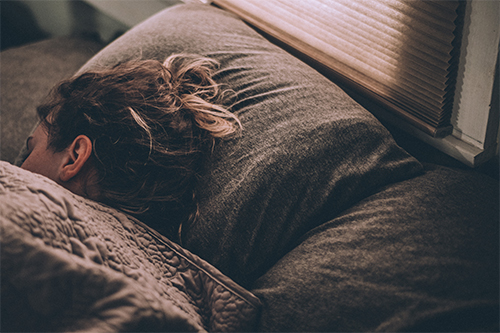Getting a good night’s sleep is crucial for your health — those ZZZs help keep your immune system strong, blood sugar under control, and can even ward off weight gain. In theory, getting eight hours of pillow time sounds great. But, even if you do everything the experts recommend, like creating a dark and cool room and keeping a consistent sleep schedule, there are several health conditions that can disrupt your sleep and make it hard to actually feel well rested. Read on to see if you have any of these eight health conditions that could be meddling with your sleep, plus get expert tips for addressing them.
1. Mouth Breathing
Breathing through your mouth when you sleep can cause you to snore, get dry mouth, and even cause fatigue the next day. Nasal breathing, on the other hand, can lead to higher-quality sleep. Ultimately, nasal breathing can reduce snoring and better your sleep pattern, explains Hinsdale, Illinois dentist Adam R. Winckler, DDS. Nasal breathing helps better control CO2 expiration, and reduces over-breathing. Nitric oxide is better controlled, which results in vasodilation of the cardiovascular system. This helps lead to a sleep pattern where you’re not waking up as much during the night and are going through the reparative and regenerative phases of sleep, meaning you’re not fatigued during the day, he explains.
What to do: So, how exactly do you become a nasal breather in your sleep? Try mouth taping, Winckler suggests. To do so, you can use 3M Micropore paper tape. If it sounds intimidating, try it while you’re awake for 10 minutes. You’ll cut strips and apply them before you sleep, unless you’re sick to your stomach with the chance you’ll vomit. You can fold a tab on both ends for easy removal. A pro tip from Winckler: The tape gets sticky after application. You can reduce this by applying the strip to your bed shirt once or twice and then applying to your mouth either vertically, diagonally, or horizontally. Mouth tape should be worn for at least six months while you’re training yourself to breathe through your nose. If you need to open your sinuses, try steam showers, a sinus lavage with a neti pot and saline solution, a saline spray, decongestants during the day (they’re stimulants and could keep you awake at night), or over-the-counter allergy medications.
2. Heartburn
Heartburn happens when stomach acid flows back up the esophagus, the tube that delivers food to your tummy. Ever notice heartburn gets worse when you’re trying to sleep? That’s because when you’re lying down, the symptoms worsen, making it difficult to fall asleep.
What to do: The National Sleep Foundation has several suggestions for preventing heartburn, and thus, getting better sleep. The leading tip, though, is to avoid fatty or fried foods at dinnertime, and steer clear of alcohol and nicotine. It’s a good idea to eat your last meal of the day three hours before going to bed because lying down after dinner can trigger acid to rise up from your stomach. Also, try sleeping on your left side, the NSF suggests, because it helps relax the lower esophageal sphincter that’s wedged between your stomach and esophagus. Taking antacids and maintaining a healthy weight can also help eliminate heartburn.

3. Neck or Back Pain
When you’ve got neck pain or an achy back, it can be difficult to find a comfy position to sleep in, says chiropractor Alex Tauberg with Tauberg Chiropractic and Rehabilitation in Pittsburgh. “Maybe you only have one particular spot that is comfortable, but you can’t stay in that one spot all night,” he says. “So you end up having a hard time falling asleep, waking up throughout the night, and having trouble getting back to sleep.”
What to do: Make an appointment with a qualified neck or low back pain specialist, Tauber suggests. The specialist can help you determine the cause of your pain and help you find relief during sleep. This could mean something as simple as changing your mattress or pillow, he says, or doing recommended exercises. In some cases, you may need surgery.
4. Anxiety
Anxiety disorders are the most common mental illness in the United States, and affect more than 18 percent of adults, says Laura Chackes, Psy.D., the owner and clinical director of The Center for Mindfulness & CBT in St. Louis. “People with anxiety tend to have trouble falling asleep and staying asleep due to worry or overthinking situations,” she explains. “When it’s time to fall asleep, they often are not able to shut off their minds.”
What to do: Research has pointed to the benefits of mindful meditation for anxiety, says Chackes. Regular meditation not only calms the mind and body to prepare you for sleep, but it can also improve your quality of sleep, she says. Also, Cognitive Behavioral Therapy (CBT) can help treat anxiety disorders and insomnia, she says. It includes relaxation strategies, setting up a sleep routine, challenging distorted thoughts about sleep, and exercising during the day.

5. Depression
While some people with depression tend to sleep too much, others have insomnia, Chackes says. There is also a large overlap between depression and anxiety, as nearly half of the people diagnosed with depression are also diagnosed with an anxiety disorder, she says.
What to do: As is the case for anxiety, mindful meditation and CBT treatment can be helpful to improve sleep among people who suffer from depression as well. Antidepressant medications can also help aid sleep, Chackes says.
6. Post-Traumatic Stress Disorder
Post-Traumatic Stress Disorder, or PTSD, can disrupt sleep because the traumatic event is recurring in an individual’s thoughts and feelings, says Nicole Carey, LPC with Empowering Solutions Counseling, LLC in Michigan. Without being able to relieve the stress of the trauma, people with PTSD continue to have disrupted sleep patterns.
What to do: Seek psychotherapy from a licensed mental health professional, Carey suggests. You can also use relaxation techniques liked meditation throughout the day and shortly before bed. In more extreme cases, a psychiatrist or physician may prescribe a medication to aid with sleep.
7. Diabetes
Symptoms of uncontrolled diabetes can include feeling thirsty, having a frequent need to urinate, and night sweats. Also, low blood glucose may cause people with diabetes to wake up at night and feel sweaty, dizzy, or shaky, according to the Joslin Diabetes Center, a leading diabetes research center.
What to do: If you’re concerned you might have undiagnosed diabetes, see your doctor for testing. If you do have diabetes, work with your physician to better manage your blood glucose levels. If you’re taking insulin, have a conversation with your doctor about how adjusting your diet and exercise, as well as your medication, could help you get better sleep at night.

8. Frequent Nighttime Bathroom Breaks
Defined, nocturia is when you frequently wake up at night to urinate. This could occur twice a night in mild cases and up to five or six time a night in more severe cases, according to Harvard Medical School. While nocturia is something that can occur with age, it can also be a marker of other medical conditions, including heart or liver failure, sleep apnea, diabetes, or a urinary tract infection, to name a few. It can also be caused by medications, especially diuretics, or drinking too much before bed.
What to do: First, you can try to identify what’s causing nocturia and try to correct it. Try cutting down how much you drink two hours before bedtime, Harvard health professionals suggest, especially when it comes to alcohol and caffeine. If that doesn’t help, consult with your physician. There are medications that can treat overactive bladders.
 Brittany Anas is a freelance writer who specializes in health, fitness, and travel writing. She also contributes to Men’s Journal, Women’s Health, Trip Savvy, Simplemost, Orbitz, and Eat This, Not That! She spent a decade working at daily newspapers, including The Denver Post and the Daily Camera in Boulder, Colorado, and she is a former federal background investigator. In her free time, Brittany enjoys hiking with her gremlin-pot belly pig mix that the rescue described as a “Boston Terrier” and coaching youth basketball. She also works with domestic abuse survivors, helping them regain financial stability through career coaching. Follower her on Twitter and Instagram.
Brittany Anas is a freelance writer who specializes in health, fitness, and travel writing. She also contributes to Men’s Journal, Women’s Health, Trip Savvy, Simplemost, Orbitz, and Eat This, Not That! She spent a decade working at daily newspapers, including The Denver Post and the Daily Camera in Boulder, Colorado, and she is a former federal background investigator. In her free time, Brittany enjoys hiking with her gremlin-pot belly pig mix that the rescue described as a “Boston Terrier” and coaching youth basketball. She also works with domestic abuse survivors, helping them regain financial stability through career coaching. Follower her on Twitter and Instagram.
